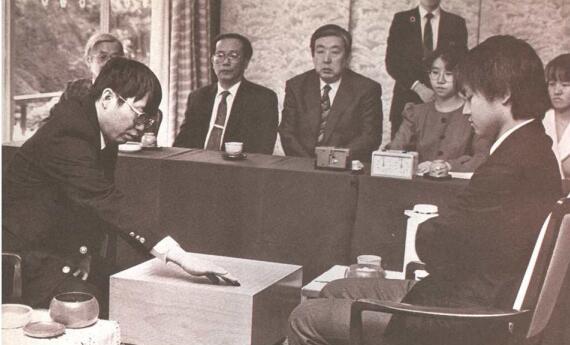Recently, the Tokyo Olympic Games are in full swing, and many fierce confrontations between China and Japan have become the focus of everyone's attention. When it comes to the competition between China and Japan, Go is probably the oldest and most ups and downs.

Nie Weiping defeated Yoshiki Iida
After three consecutive defeats in the ring, Japanese Go began to bottom out, and they knew more about Chinese players. In the fourth ring, Japanese pioneer Kiki Iida won six consecutive victories and killed in front of China's main player Nie Weiping. Nie Weiping withstood the huge pressure, and finally repelled the menacing Japanese guys.
Although after winning Awaji Shuzo again, Nie Weiping lost to Yugen Taisho, and China eventually lost this time, but Nie Weiping preserved the dignity of the Chinese team. Nie Weiping won 11 consecutive victories from the first to the fourth ring, a record that no one could break until the end of the Sino-Japanese ring.
Nie Weiping lost to Taisho Hagen and ended the ring winning streak
Starting from the fourth China-Japan Go Tournament, China and Japan entered the tug-of-war stage and won each other. In the fifth tournament, the Chinese team won 8-3, Qian Yuping ended the ring; the sixth tournament, the Japanese team won 8-7, Masao Kato finally took revenge, the main battle won Nie Weiping; the seventh, the Japanese team won 7-5, Awaji Shuzo ended the match; the eighth, the Japanese team won 7-3, Ieda Kiki finally ended a ring; the ninth Chinese team won 6-3, Cao Dayuan became the terminator, and this competition, a new star of the Chinese team debuted in the ring, he is Chang Hao.
Chang Hao made his debut in the ring
At this time, the Go world has entered the era of world championship competition. In 1988, the first Fujitsu Cup and the Ying Cup World Go Championship were held successively, and For the first time, Go had the concept of a world champion.
The confrontation between China and Japan, in addition to the ring match, is more unfolding on the stage of the world competition, and there are wins and losses for each other. However, the final between China and Japan in the World Series was unexpectedly small, and between 1988 and 2000, 34 world championship trophies were born, of which only four were showdowns between China and Japan, mainly in the Fujitsu Cup. The third Nie Weiping was defeated by Lin Haifeng, the fourth Qian Yuping abstained from losing Zhao Zhixun due to illness, and the eighth Ma Xiaochun defeated Kobayashi Koichi. There was also a Chunlan Cup Ma Xiaochun defeated Wang Licheng.
HomePage Ying's Cup Final Cho Hwan Hyun turned out
And the originally unknown Korean Go suddenly rose. Since Cao Xuanxuan defeated Nie Weiping to win the first Ying's Cup, Korean Go has been out of control, and strong players such as Lee Chang-ho, Yoo Chang-hyuk, and Seo Bong-so have continued to emerge.
World Go gradually changed from the Sino-Japanese struggle for hegemony to the Romance of the Three Kingdoms. It's like a long-distance running race, the second place is hard to catch up with the first, and suddenly find that the third place next to it is suddenly emerging. The contest between two people became a tangle of three people.
Final of the Go World Series before 2000
(To be continued)
(Chess and Card In-depth Reporting Group Xingyu)